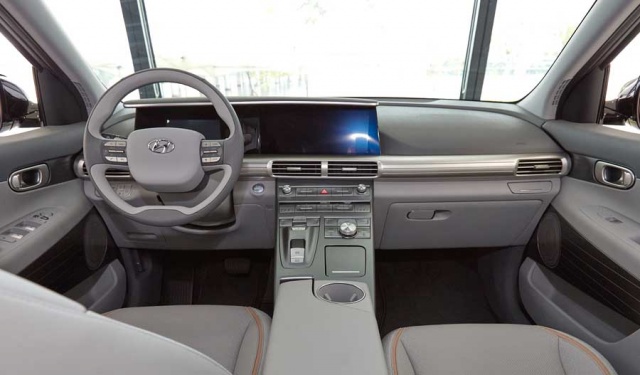What's the news?
This is Hyundai's second attempt at a hydrogen fuel cell electric vehicle (FCEV), following on from the ix35 Fuel Cell, and it has been previewed in near-production ready form at the company's Seoul headquarters as part of a special event.
Taking its visual inspiration from the FE Concept that Hyundai showed at the Geneva Motor Show 2017, the FCEV showed off the general appearance of the hydrogen-powered SUV that will be launched onto the market early in 2018.
The Hyundai uses the fourth generation of fuel cell technology and has enhanced fuel cell efficiency (up to 60 per cent, an increase from the ix35's 55.3 per cent) that allows it to go up to 800km on a single charge, extra power (up 20 per cent from its predecessor to 163hp here), the ability to start in temperatures as low as -30 degrees centigrade, more durability thanks to new catalyst technology and a better arrangement of tank storage - three equally-sized tanks are now fitted to the FCEV, rather than two mismatched items.
Additionally, Hyundai says the mass-produced FCEV will boast all of the company's Advanced Driver Assistance Technologies (ADAS), with the features disclosed in full in January 2018, at the Consumer Electronics Show (CES) - as will its official model name, which has not yet been revealed.
Lee Ki-sang, senior vice-president of Hyundai Motor Group's Eco Technology Centre, said: "With exceptional efficiency, serene styling, and uncompromised performance, our next generation fuel cell SUV is the true epitome of an eco-friendly vehicle of the future. Hyundai Motor will take lead in developing and producing green energy vehicles that would ultimately complement a near-zero emission society."
Anything else?
Like the concept shown in Geneva earlier this year, the FCEV revealed in Seoul has styling which takes its inspiration from water, the car's only emission. It's also extremely aerodynamic, even featuring low-drag alloy wheels, while inside is a 'clean and simple' interior layout which integrates high-tech elements neatly to reduce clutter.
The new FCEV SUV will be part of Hyundai's plans to launch 31 eco-friendly (read: low-emission) vehicles to global markets by 2020, although that also includes models wearing the Kia badge as well. For Hyundai, some of the next steps along the road include an EV version of the Kona compact SUV, with a 390km range, in the first half of 2018, an EV version of the Genesis in 2021 and a long-range EV, capable of going more than 500km, some time after 2021.








